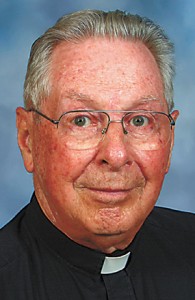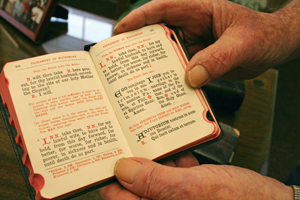By Barb Arland-Fye

Father Maynard Brothersen, the second-most senior priest of the Davenport Diocese, was in his 14th year as assistant pastor at St. Paul the Apostle Parish in Davenport when the Second Vatican Council opened.
He had served at St. Paul’s since shortly after his ordination and remained there until 1966, five months after the Second Vatican Council ended. For him, the most profound changes to come out of the council were having the priest turn around to face the congregation during Mass and celebrating the Mass in English.
“When we started facing the people it made sense to say the Mass in English. When the Mass was in Latin, people had their heads buried in the Missal” reading the English translation, Fr. Brothersen said. “People followed the missal because the priest had his back to them.”
Fr. Brothersen, now 88, recalls instructing parishioners on how to give responses for the Mass in English while the pastor was saying Mass.
Facing the people provided a perspective that he and other priests hadn’t anticipated. “It was distracting for the priest to see people coming and going during the Mass.”
He appreciated being able to celebrate the Mass in English, but the language change required some adjustments as well. Latin prayers that Fr. Brothersen had memorized years earlier were unfamiliar in English. Initially, he depended more heavily on reading the prayers until he absorbed them.
He likens that situation to the implementation of the new Roman Missal in Advent 2011. Word changes in prayers initially necessitate reading them from the book rather than from the heart.
Fr. Brothersen appreciates that he can concelebrate the Mass with his fellow priests, a positive impact of Vatican II along with celebrating the Mass in English and facing the congregation.
But the retired priest believes that Vatican II resulted in a relaxation of rules that has negatively impacted the Church. He thinks most people are not well versed on the Vatican II documents and that some Catholics made their own rules based on what they thought the documents said.
“I think there are three generations of Catholics who do not know why they are Catholic,” he said. “Catechesis got thrown out the window.”

He noted that a number of priests also left the priesthood after Vatican II; he thinks they simply stopped praying. In fact, he thinks many people have forgotten how to pray.
“Children today don’t know their prayers. Parents don’t know their prayers. There aren’t praying families, although there are some exceptions,” he said.
Fr. Brothersen misses what he believes to have been a stronger sense of obedience in the Church before Vatican II.
He and other retired priests of the diocese “were raised to be obedient,” starting out as assistant pastors and remaining in that role sometimes for many years.
“You did what the pastor told you to do,” he said.
Today, he has the opportunity to say Mass at Assumption High School in Davenport and at a senior living complex.
He and other retired priests who live in diocesan headquarters concelebrate daily Mass at 7 a.m. in the chapel there. The Mass, he said, “is our life.”








